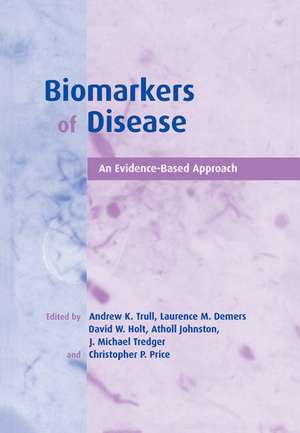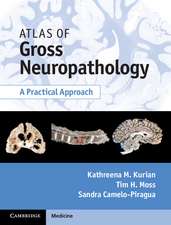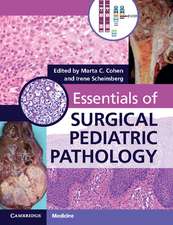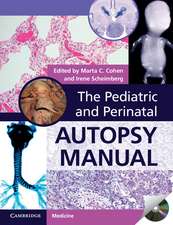Biomarkers of Disease: An Evidence-Based Approach
Editat de Andrew K. Trull, Lawrence M. Demers, David W. Holt, Atholl Johnston, J. Michael Tredger, Christopher P. Priceen Limba Engleză Paperback – 29 oct 2008
| Toate formatele și edițiile | Preț | Express |
|---|---|---|
| Paperback (1) | 514.70 lei 43-57 zile | |
| Cambridge University Press – 29 oct 2008 | 514.70 lei 43-57 zile | |
| Hardback (1) | 1962.25 lei 43-57 zile | |
| Cambridge University Press – 5 iun 2002 | 1962.25 lei 43-57 zile |
Preț: 514.70 lei
Preț vechi: 541.79 lei
-5% Nou
Puncte Express: 772
Preț estimativ în valută:
98.51€ • 101.52$ • 83.17£
98.51€ • 101.52$ • 83.17£
Carte tipărită la comandă
Livrare economică 03-17 martie
Preluare comenzi: 021 569.72.76
Specificații
ISBN-13: 9780521088602
ISBN-10: 0521088607
Pagini: 520
Ilustrații: 62 b/w illus. 52 tables
Dimensiuni: 156 x 230 x 26 mm
Greutate: 0.82 kg
Ediția:1
Editura: Cambridge University Press
Colecția Cambridge University Press
Locul publicării:Cambridge, United Kingdom
ISBN-10: 0521088607
Pagini: 520
Ilustrații: 62 b/w illus. 52 tables
Dimensiuni: 156 x 230 x 26 mm
Greutate: 0.82 kg
Ediția:1
Editura: Cambridge University Press
Colecția Cambridge University Press
Locul publicării:Cambridge, United Kingdom
Cuprins
Part I. Assessing and Utilising the Diagnostic and Prognostic Power of Biomarkers: 1.1. Evidence-based medicine: evaluation of biomarkers; 1.2.Development of biomarkers - the industrial perspective; 1.3. Statistical approaches to rational biomarker selection; 1.4. Using intelligent systems in clinical decision support; Part II. Biomarkers of Kidney Disease and Dysfunction: 2.1. Biomarkers in renal disease; 2.2. The genetics of renal disease; 2.3. Early markers of nephrotoxicity for environmental and occupational monitoring; 2.4. The early detection of renal impairment in diabetes mellitus; Part III. Biomarkers of Bone Disease and Dysfunction: 3.1. Bone turnover markers in clinical practice; 3.2. Biomarkers of bone formation; 3.3. Biochemical markers of bone resorption; 3.4. The clinical application of biomarkers in osteoporosis; 3.5. Sources of pre-analytical variability in the measurement of biochemical markers of bone turnover; 3.6. Genetic approaches to the study of complex diseases: osteoporosis; Part IV. Biomarkers of Liver Disease and Dysfunction: 4.1. Biomarkers of hepatic disease; 4.2. The immunogenetics of metabolic liver disease; 4.3. Toxicogenetics of liver dysfunction; 4.4. Prognosis and management of patients with acute liver failure; 4.5. Biomarkers in artificial and bioartificial support; 4.6. Prognostic markers in liver disease; 4.7. Apoptosis: biomarkers and the key role of mitochondria; 4.8. Liver regeneration: mechanism and markers; 4.9. Determinants of response to viruses and self in liver disease; 5.0 IL-6-type cytokines and signalling in inflammation; Part V. Biomarkers of Gastrointestinal Disease and Dysfunction: 5.1. Biomarkers in gastrointestinal disease; 5.2. Tumour markers in gastrointestinal disease; 5.3. Markers of malabsorption: coeliac disease; Part VI. Biomarkers in Toxicology: 6.1. Genomics and biomarkers in toxicology; 6.2. Protein profiling and proteomic databases; 6.3. Biomarkers for evaluating the safety of genetically modified foods; Part VII. Biomarkers of Cardiovascular Disease and Dysfunction: 7.1. The impact of biochemical tests on patient management; 7.2. Cardiac naturetic peptides in risk assessment of patients with acute myocardial infarction or congestive heart failure; 7.3. Serum markers of inflammation and cardiovascular risk; 7.4. The clinical significance of markers of coagulation in acute coronary syndromes; 7.5. Endothelin - what does it tell us about myocardial and endothelial dysfunction?; 7.6. Homocysteine - a reversible risk factor for coronary heart disease; 7.7. Matrix metalloproteinases and their tissue inhibitors; Part VIII.. Biomarkers of Neurological Disease and Dysfunction: 8.1. Biomarkers of neurodegenerative disorders; 8.2. Traumatic brain injury: assessment by biochemical serum markers; 8.3. An overview of S-100beta as a clinically useful biomarker of brain tissue damage; Part IV. Biomarkers in Transplantation: 9.1. Monitoring heart and lung transplant recipients Marlene Rose; 9.2. Monitoring liver transplant recipients; 9.3. Chronic allograft damage index as surrogate marker for chronic allograft rejection; 9.4. Advances in pharmacodynamic biomarkers for monitoring the response to immunosuppressive drug therapy; 9.5. The use of biomarkers for monitoing the response to immunosuppressive drug therapy; 9.6. Post-transplantation bone disease; 9.7. Molecular diagnosis of cytomegalovirus diseases; 9.8. Diagnosis and monitoring of inflammatory events in transplant recipients; Index.
Recenzii
Review of the hardback: '… contains an amazing wealth of information … I know I will refer to it frequently … and will keep it readily accessible on my bookshelf.' Doody's
Descriere
A critical, evidence-based look at diagnostic tests which are increasingly being used to evaluate organ damage and dysfunction.










